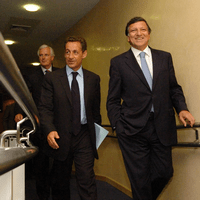BRUSSELS -- While media and popular attention has focused on the European Union's nominations for its newly created positions of president and high representative for external affairs, key positions recently filled on the European Commission suggest a major shift in the EU's economic policies. In an apparent reaction to the financial and economic crisis, the commissioners chosen for the main economic portfolios are likely to alter the union's pro-market approach of recent years.
The commission is the EU's supranational institution, with functions similar to the executive branch of national governments. Although each country is guaranteed a commissioner, the importance of each of the portfolios varies. So while the commission is supposedly free from national interference, member states struggle to secure the top positions.
The most sought-after portfolios are the ones that deal with economic affairs, where the EU's integration efforts have advanced the most. The Directorate-General for Competition is regarded as the most important, with Economic and Monetary Affairs, Internal Market, and Trade also considered key posts.

